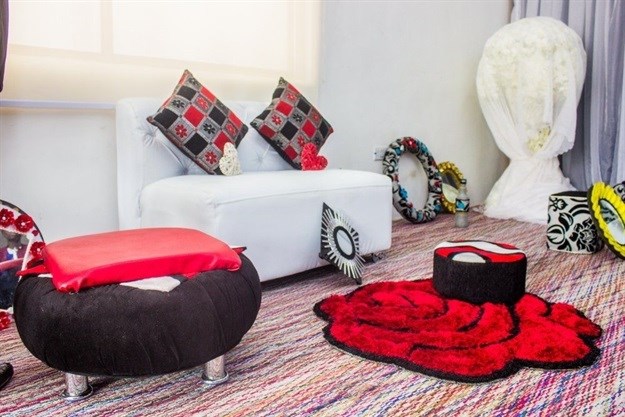This was the ‘lightbulb moment’ for Ayeni-Babajide who would later go on to establish Pearl Recycling as a social enterprise and upcycling furniture business that turns solid waste into creative works of art. “It was at that moment that I asked myself, ‘I wonder if I too can build something meaningful from waste and do something like this in Nigeria?’” she says. “So that was actually what piqued my curiosity and led me to learn more about the recycling and upcycling of waste.”
Waste management in Nigeria is an enormous problem. With a population exceeding 170-million, more than 32 million tonnes of solid waste, is generated annually, out of which only 20% to 30% is collected. The rest, Ayeni-Babajide tells me, accumulates in the streets and canals of the country’s neighbourhoods and villages. “Every time I would go out of my home to go to work, I would see a lot of waste on the streets and it was becoming a real problem in the community,” she says. “I started to think of this problem as something beyond just recycling.”

Utilising everything from tyres, bottles, newspapers, magazines, straws, and plastic cutleries to wood, unused CDs, tapes and even sea shells, Pearl Recycling turns solid waste materials into objects that have value like tables, chairs, home décor and various other things to beautify homes and offices. One of the products Ayeni-Babajide says she is most proud of is their Ottoman Table. Made from recycled tyres, the object is reportedly one of the company's most popular items.
Aside from the beautiful furniture they produce from upcycled waste, Pearl Recycling also has a more altruistic mission: to use the business to alleviate poverty and to aid people – particularly uneducated, vulnerable women and girls – by bestowing upon them a skill set that can bring them an income. The organisation also employs young Nigerians to gather these waste products; simultaneously helping to curb unemployment and clean up the city.
“We create jobs in so many ways,” Ayeni-Babajide explains. “Through our trash for pay initiative, we encourage people to bring their waste into our workshop which we pay them for. And in terms of training, we are especially focused on women and girls, particularly those that are not educated. We also allow people to bring in their trash and to take some of our products at a discounted rate – which is helping the local economy.”
Pearl Recycling is also working to make the concepts of climate change and environmental stability less alien to the citizens of Nigeria. “Our people aren’t as learned on the topic,” Ayeni-Babajide tells me. “But I think that just by us incentivising people, by us talking about the issues out in the open, and having NGOs that provide this kind of education, people’s perceptions are already changing.”
Today, Pearl Recycling continues to equip people in the region with the skills necessary to identify valuable discarded waste and patronise these local artisans to help them build their businesses. They’re also creating upcycling hubs across Lagos while starting to look at expansion beyond Nigeria. “The truth is, we all need to contribute to looking after our environment, even if it’s in the smallest way. So if you can show people that ‘Look this tyre can become a chair’ or ‘Look this piece of trash can become a table – that has value. It’s all about teaching people about the value that lies in waste.”
For more on Pearl Recycling, click here.





























